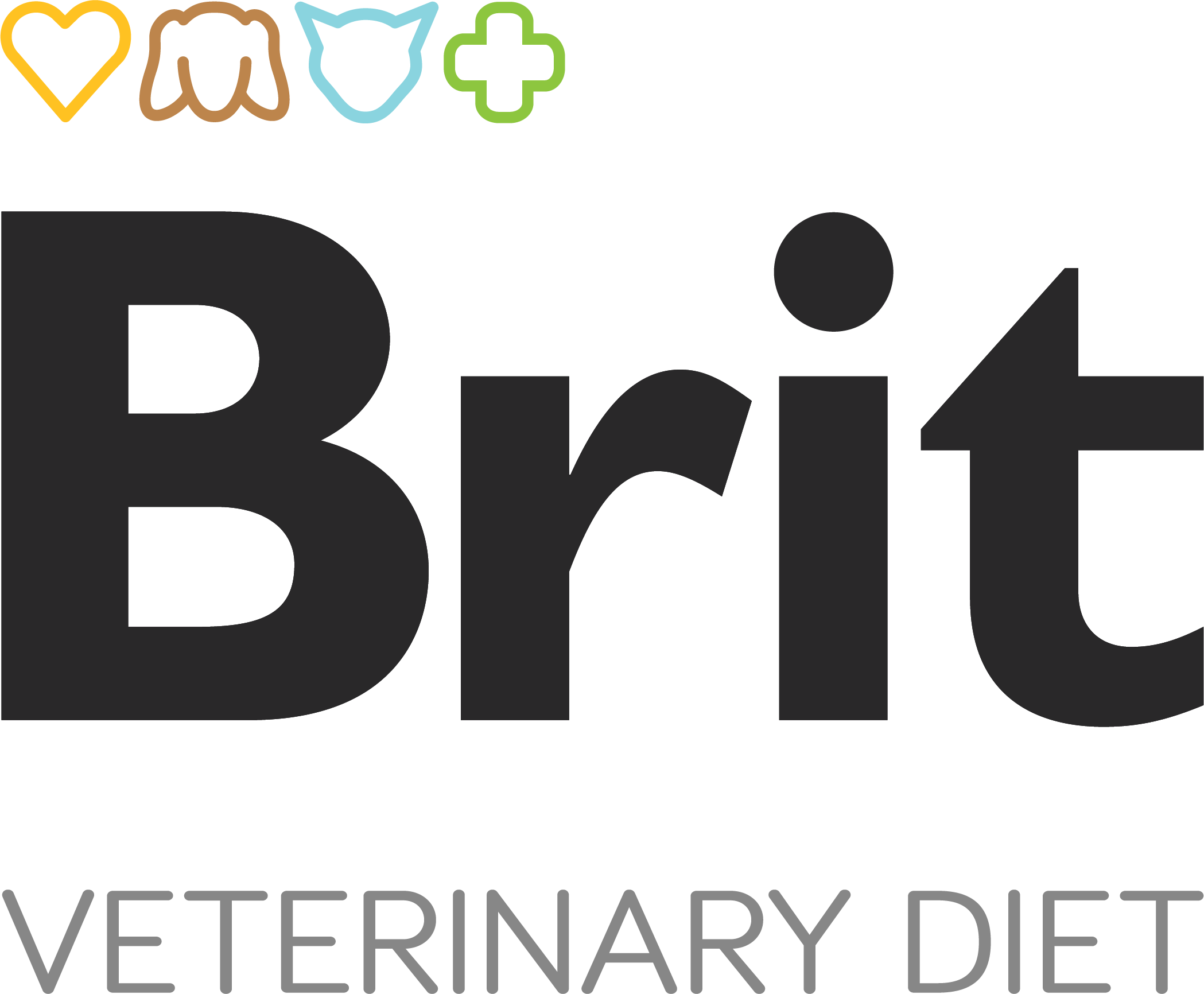Brit Grain-Free Veterinary Diet
Brit Grain-Free Veterinary Diets are a range of specially formulated gluten-free prescription diets for veterinary use. Brit Grain-Free Veterinary Diets have been developed based on the latest findings in the nutritional management of canine and feline diseases as well as Brit’s extensive experience and knowhow in the development and production of superpremium grain-free pet foods. Carefully selected protein sources and functional ingredients, such as live probiotics, vitamins, and DHA and EPA fatty acids, meet pets’ nutritional needs and support their health and overall wellbeing.
Brit Grain-Free Veterinary Diets provide the following advantages and benefits in the nutritional management of canine and feline disorders for your daily veterinary practice:
1. Grain-free range of veterinary diets
Brit Grain-Free Veterinary Diets are formulated with an innovative source of starch – yellow pea – which allows us to exclude any plant material containing gluten. Formulas based on yellow pea provide the following nutritional benefits for prescription diets:
-
Decreased risk of adverse food reactions (food allergies) to gluten, one of the top five most common food allergens.1,2 A significant number of adverse food reactions with dermatological presentation (pruritus, otitis externa) or gastrointestinal presentation (IBD, gluten enteropathy2,3) are due to gluten hypersensitivity.
-
Pea is a source of carbohydrates with a low glycaemic index (GI) of 28–39 compared to carbohydrates from wheat, corn, or rice, which have a glycaemic index of 75–100 after extrusion. These grains are high in carbohydrates and have a high glycaemic index. The glycaemic index indicates the rate at which both fast and slow carbohydrates are absorbed from the intestine into the bloodstream. The glycaemic index also shows to what extent a given food raises blood sugar levels when compared with pure glucose with a reference value of 100. A glycaemic index below 55 is considered low, while more than 70 is high. This also means that ingredients with a glycaemic index of less than 55 raise blood sugar levels moderately. A low glycaemic index is important for controlled postprandial glucose absorption and insulin concentration in diabetic and prediabetic pets.5, 6, 7, 8 High blood sugar raises blood insulin levels and, over time, can lead to insulin resistance and obesity, which has become a major problem for dogs and cats in Western countries.
-
Pea is a rich source of nutritionally valuable dietary fibre with an optimal ratio of soluble and insoluble fibre (75:25), which improves the diversity of dietary fibre and prebiotics in the gastrointestinal microbiome. Moreover, dog and cat studies have shown that carbohydrate sources like pea and lentils with higher concentrations of fibre tend to have a lower glycaemic and insulin response compared with diets based on corn or rice.5,8
2. Veterinary diets based on ingredients with a low risk of food allergy
The most aggressive allergens for dogs and cats are proteins obtained from beef, dairy, chicken, wheat, soy, and corn.1 Brit Veterinary Diets have been developed to decrease the risk of food allergy as much as possible. Brit Veterinary Diets do not contain any sources of gluten, and the majority of the products contain no chicken protein. Brit VD Hypoallergenic does not even contain any chicken fat. Most of the products are based on limited protein sources and novelty proteins such as salmon, herring, lamb, turkey, and eggs.
3.Veterinary diets with live probiotics and prebiotics
These days, there is much concern about the quality of the gastrointestinal microbiome. Studies on human and animal models have clearly demonstrated that gastrointestinal microbiota play an essential role in all aspects of physical and mental health. Probiotics and prebiotics are known to have a positive and beneficial effect on gastrointestinal microbiota and the body’s immune function.
Brit Veterinary Diets contain an encapsulated form of live lyophilizate of the probiotic strain Enterococcus faecium that allows the bacteria to survive in the acidic stomach and colonize the gut together with prebiotics and dietary fibre from a variety of sources (FOS, pea, psyllium, buckwheat, apple pulp, Ascophyllum nodosum algae, yeast extract MOS and β-glucans, Mojave yucca, and sea buckthorn). A regular diet containing Enterococcus faecium and various sources of dietary fibre and prebiotics provides the best environment for optimal gastrointestinal microbiota.9,10
4. Veterinary diets with a high concentration of EPA and DHA from plankton
Omega-3 fatty acids are essential nutrition for dogs and cats and have many direct and indirect biological effects on the body and physiological functions. The omega-3 fatty acids DHA and EPA have several beneficial effects on health. Fatty acids are found throughout the body, especially in cell membranes. Omega-3 fatty acids affect the skin, coat, mucosa, hormonal function, joint metabolism, cardiovascular system, brain, nervous system, and immune system. The best known and well described property of omega-3 is its anti-inflammatory activity.
Omega-3 in pet food is commonly supplied from fish oil (EPA and DHA) or vegetable oils (ALA). The only active forms of omega-3 in the body are EPA and DHA obtained from fish or algae. Vegetable ALA must first be converted to DHA and EPA in order to deliver the beneficial effects of omega-3. The conversion rate of ALA to DHA in dogs and cats is approximately 10–15%, which is ideal for a healthy pet but not for an unhealthy one. Due to the unstable and low content of EPA and DHA in fish oil, Brit Veterinary Diets contain plankton (Schizochytrium limacinum) as a source of EPA and DHA, which contains 40% DHA as a source of the active form of omega-3 in a stable concentration.
5. Meat-based veterinary diets
Brit Veterinary Diets have animal-origin proteins as the first ingredient listed in the composition. Animal protein is more biologically appropriate for canine and feline nutrition than plant-origin proteins such as corn gluten and soy.11,12
At Brit, we believe dogs and cats are still carnivores, so we constantly work to develop meat-based veterinary diets that are best meet their needs. We believe that even sick animals deserve a high-quality and biologically appropriate diet.
